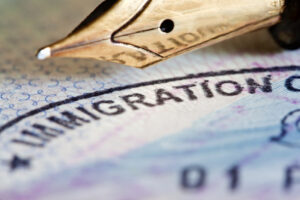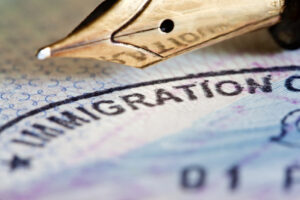
The
H-1B
program
is
in
serious
trouble
and
needs
immediate
reform.
Across
the
country,
American
businesses
rely
on
the
program
for
foreign
high-skilled
workers
because
America
simply
does
not
produce
enough
of
them.
The
program
is
utilized
in
every
industry
and
by
almost
all
professions,
including
IT
professionals,
doctors,
engineers,
teachers,
life
scientists,
architects,
mental
health
counselors,
and
accountants.
With
only
85,000
visas
available
annually,
USCIS
received
over
780,000
applications
this
year.
The
Department
of
Homeland
Security
has
confirmed
fraudulent
applications
were
filed
and
is
investigating
the
situation
while
working
to
create
new
regulations.
But
it
is
essential
to
understand
that
this
is
not
just
a
regulatory
issue.
It
is
something
that
Congress
must
address
urgently.
And
those
affected
by
fraud,
particularly
international
students
who
recently
graduated
with
no
visa
time
remaining,
must
have
a
one-time
solution
while
DHS
addresses
the
issue.
My
clients
are
generally
small
to
medium-sized
businesses,
and
those
which
filed
H-1B
applications
this
year
lost
out.
Of
the
immigration
lawyers
I
have
spoken
to,
most
reported
a
less
than
10%
selection
rate.
The
majority
of
the
beneficiaries
of
these
cases
were
likely
international
students
who
graduated
from
U.S.
schools.
And
while
the
impact
of
this
is
not
yet
visible,
it
will,
in
my
opinion,
be
far-reaching.
First,
a
little
history.
Congress
created
the
H-1B
program
in
1990
and
originally
capped
it
at
65,000
available
visas.
For
fiscal
years
1999
and
2000,
the
quota
increased
to
115,000
from
65,000.
The
quota
increased
to
195,000
in
fiscal
years
2001,
2002,
and
2003.
After
that,
the
cap
returned
to
65,000;
and
in
2004,
Congress
added
20,000
visas.
That
is
how
we
got
to
85,000.
The
caps
are
for
each
fiscal
year,
which
starts
on
October
1,
and
H-1B
visas
can
be
filed
six
months
in
advance
of
that
date.
Up
until
2018,
we
lawyers
would
work
several
months
in
advance
to
file
fully
prepared
applications,
2-to-3
inches
thick,
to
ship
on
March
31,
to
reach
USCIS
on
April
1,
and
cross
our
fingers.
The
last
year
we
filed
cases
in
this
manner,
USCIS
received
just
under
200,000
applications.
During
the
Trump
administration,
the
H-1B
program
came
under
much
scrutiny.
Among
the
various
misunderstandings
of
the
program,
the
administration
suggested
that
H-1B
workers
are
paid
a
lower
salary.
However,
in
a
recent
article,
Stuart
Anderson
at
the
National
Foundation
for
American
Policy
confirms
that
H-1B
employees
indeed
earn
high
salaries.
On
the
heels
of
this
and
other
debates,
the
Trump
administration
changed
the
procedure
for
the
application.
Instead
of
filing
a
complete
petition
with
all
the
fees,
a
new
electronic
registration
process
was
introduced
where
the
employer
would
pay
only
$10
to
enter
the
beneficiary’s
name
into
the
“lottery”
selection.
Many
were
immediately
concerned
about
fraudulent
applications,
but
those
concerns
were
dismissed.
However,
it
does
appear
that
many
companies
that
wouldn’t
necessarily
fork
out
about
$5,000
to
$8,000
per
application
(the
average
combination
of
lawyer
and
USCIS
filing
fees)
were
happy
to
try
their
hands
for
$10.
And
that
is
evident
from
the
number
of
applications
that
started
grow.
The
new
system
was
implemented
on
April
1,
2019
(fiscal
year
2020).
In
fiscal
years
2021,
2022
and
2023,
USCIS
received
274,237;
308,613;
and
483,927
applications,
respectively.
In
the
fiscal
year
2024
(filed
March
2023),
a
staggering
780,884
were
filed.
You
can
see
the
dramatic
rise
in
the
numbers.
So
what
is
the
impact
of
this
situation?
When
small
to
medium-size
businesses
file
H-1Bs,
it
can
be
a
big
decision
because
there
is
a
real
cost
behind
it
(both
in
the
attorney
and
filing
fees,
but
also
in
the
precious
bandwidth
they
must
use
in
order
to
prepare
the
filing)
that
affects
their
bottom
line.
They
apply
because
they
need
the
employees
and
often
can’t
find
qualified
Americans
to
do
the
job.
According
to
the
U.S.
Bureau
of
Labor
and
Statistics,
America
has
over
10
million
job
openings.
Even
though
many
people
have
been
laid
off
in
the
past
nine
to
12
months,
positions
still
need
to
be
filled.
In
addition,
the
Chips
and
Science
Act
that
passed
recently
requires
highly
skilled
workers
to
help
fulfill
the
goal
of
the
law.
John
Dearie,
President
of
the
Center
for
American
Entrepreneurship,
discusses
this
in
his
recent
piece
in
The
Hill.
Vacant
positions
mean
businesses
need
help
getting
their
work
done.
And
who
are
these
businesses
serving?
The
American
consumer.
Who
is
losing
out?
The
American
consumer.
Ultimately,
the
American
consumer
and
the
American
economy
are
affected.
Let’s
also
look
at
it
from
the
international
student
perspective.
There
have
been
several
problems
plaguing
international
students
from
coming
to
the
United
States.
There
were
the
outright
bans
the
previous
administration
had
on
some
countries,
then
the
COVID-19
bans,
followed
by
consulate
processing
delays.
Together,
these
created
fear
and
the
notion
that
maybe
the
international
students
could
find
another
country
to
go
to.
And
they
did;
they
went
to
Canada,
among
other
places.
Canada
has
created
policies
to
attract
and
retain
immigrants,
including
creating
a
startup
visa.
I
have
personally
advocated
for
immigration
reform
and
a
startup
visa.
And
now,
I
am
releasing
a
new
startup
visa
guidebook
for
startup
companies
and
international
founders
so
that
we
can
keep
the
talent
in
the
United
States.
But
there
is
no
doubt
that
with
their
visa
possibilities
at
stake,
international
students
who
now
think
their
futures
could
be
cut
short
in
the
U.S.
may
want
to
avoid
investing
their
time
and
money
here.
International
students
contribute
over
$28
billion
a
year
to
the
American
economy,
and
U.S.
schools
have
already
seen
a
drop
in
numbers
and
revenue.
Many
students
who
will
miss
out
on
this
year’s
lottery
likely
also
applied
multiple
times
in
prior
years
and
missed
out
on
those,
too.
They
may
be
at
the
end
of
the
student
visa
period
and
may
not
be
able
to
afford
to
remain
in
school
long
enough
to
try
again.
What
can
be
done
about
these
students?
My
colleague
Cecilia
Esterline
at
the
Niskanen
Center
suggests
a
solution
—
offer
every
international
student
affected
by
the
fraudulent
lottery
this
year
a
one-time
extension
to
their
post-graduate
optional
practical
training
(OPT)
work
authorization.
Such
a
gesture
would
not
only
help
the
students
individually
but
also
demonstrate
a
goodwill
effort
to
solve
this
problem.
These
are
fellow
humans,
with
hopes
and
dreams
of
their
own,
not
just
numbers
in
a
lottery.
In
the
meantime,
reforming
the
H-1B
program
is
urgently
necessary
for
America
because
it
has
the
potential
to
affect
our
economic
growth.
At
a
minimum,
the
cap
should
be
increased
to
meet
the
demands
of
the
economy.
In
addition,
reasonable
measures
should
be
put
in
place
to
combat
fraud.
Both
the
administration
and
Congress
need
to
work
together
to
address
this
problem.
The
next
lottery
will
be
due
in
March
2024,
so
we
don’t
have
any
time
to
waste.
Tahmina
Watson is
the
founding
attorney
of Watson
Immigration
Law in
Seattle,
where
she
practices
US
immigration
law
focusing
on
business
immigration.
She
has
been
blogging
about
immigration
law
since
2008
and
has
written
numerous
articles
in
many
publications.
She
is
the
author
of Legal
Heroes
in
the
Trump
Era:
Be
Inspired.
Expand
Your
Impact.
Change the
World and The
Startup
Visa:
Key
to
Job
Growth
and
Economic
Prosperity
in
America. She
is
also
the
founder
of
The
Washington
Immigrant
Defense
Network
(WIDEN),
which
funds
and
facilitates
legal
representation
in
the
immigration
courtroom,
and
co-founder
of Airport
Lawyers,
which
provided
critical
services
during
the
early
travel
bans.
Tahmina
is
regularly
quoted
in
the
media
and
is
the
host
of
the
podcast Tahmina
Talks
Immigration.
She
is
a
Puget
Sound
Business
Journal
2020
Women
of
Influence
honoree.
Business
Insider recently
named
her
as
one
of
the
top
immigration
attorneys
in
the
U.S.
that
help
tech
startups.
You
can
reach
her
by
email
at tahmina@watsonimmigrationlaw.com,
connect
with
her
on
LinkedIn or
follow
her
on
Twitter
at
@tahminawatson.

